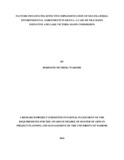| dc.description.abstract | The UN Conference on Sustainable Development in Rio dejenairo in 2012 (RIO+20 ) had as one
of it’s two main theme’s “Strengthening the institutional framework for sustainable development”.
This theme called for reforms in institutions and procedures through which governments set and
implement International Environmental Laws and Policies. Integration of environment and
development called for coordination to achieve global partnership for sustainable development.
The Convention on the Protection and Use of Transboundary Water Coarses and International
Lakes (Helsinki, Finland 1992), called upon riparian parties to cooperate on the basis of equality
and reciprocity through Bilateral and Multilateral water agreements in order to develop
harmonized policies, programmes, and strategies aimed at prevention, control and reduction of
transboundary environmental impacts. This research study was on “Factors Influencing Effective
Implementation of Multilateral Environmental Agreements in Kenya. A Case of Nile Basin
Initiative and Lake Victoria Basin Commission” and the researcher aimed to investigate the
challenges that hindered attainment of the objectives and the goals of Multilateral Environmental
Agreements in Kenya. The objectives of the study were to establish the influence of levels of
compliance, determine the influence of domestication of the requirements, assess the influence of
Monitoring and Evaluation and examine the influence of Operational Efficiency on the effective
implementation of Multilateral Environmental Agreements in Kenya. In determining effectiveness
of implementation of Multilateral Environmental Agreements, it was important to review them by
the regimes established to implement them. A regime is an implicit or explicit principles, norms,
rules and decision making procedures used in implementing an agreement. The regime/target
population were staff at Ministry of Foreign Affairs and International Trade, Ministry of
Environment and Natural Resources, National Environment Management Authority, Lake Victoria
Basin Commission and Nile Basin Initiative. This regime was viewed as a system. A system is an
arrangement of and relations between the parts which connects them into a whole. The study used
descriptive survey design, where the researcher administered research instruments to the sample
population and used descriptive and inferential statistics to establish the significant correlations
between the variables that were under investigation. The study focused on interaction with the
established organizational system and the stakeholders involved. This was an appropriate research
design for evaluating the effectiveness of the strategies for implementing developement
programmes as it used both qualitative and quantitative data to identify, analyze and interpret
conditions as they existed in relation to the set organizational guidelines. On a five point Likert
measurement scale, levels of compliance recorded an overall Mean Score of 3.69 with Standard
Deviation of 0.834, Extent of domestication of requirements Mean Score was 3.399 with Standard
Deviation of 0.98, Monitoring and Evaluation Mean Score was 2.707 with Standard Deviation of
0.862 and on Operational Efficiency the Mean Scores was 3.152 with Standard Deviation of 0.91.
This results showed high levels of compliance but lower levels of domestication of requirements,
Operational Efficiency and use of Monitoring and Evaluation in their implementation. The study
recommended that the treaty making and ratification Act of 2012 be revitalized and be made fully
operational and provisions of the act implemented to the letter. The gaps established in this study
when fully addressed will promote growth and efficiency of the established institutions and
procedures. With full compliance, full domestication of requirements, coupled with regular
Monitoring and Evaluation and enhanced Operational Efficiency in implementation of these
Agreements, it was found that the country would reap maximum benefits from these agreements.
The benefits included protection of public health and environment, participatory decision making,
networking, technology transfer and facilitating changes in domestic environmental laws. | en_US |

